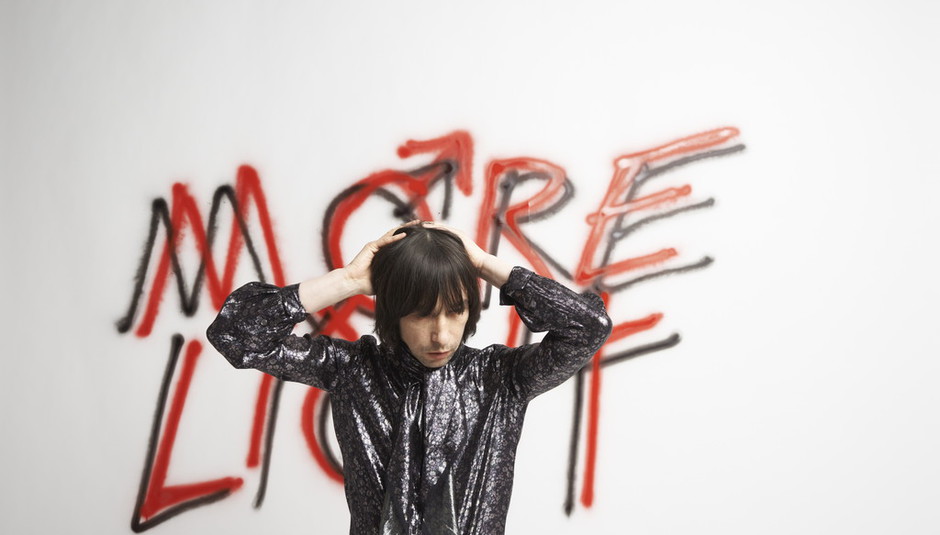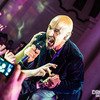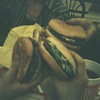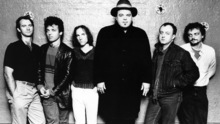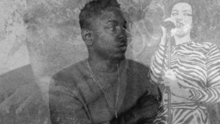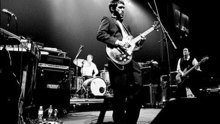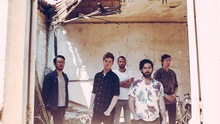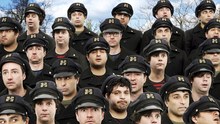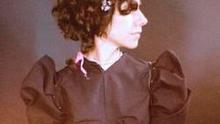As a founder member of Primal Scream some thirty years ago and former player with both The Jesus & Mary Chain and The Wake, Bobby Gillespie's status as a musical and cultural icon is assured.
Having first come to prominence via a couple of well-received singles on the legendary Creation imprint in the mid-1980s, it wasn't until the release of zeitgeist defining third album Screamadelica in 1991 that the mainstream started to take note and pay attention. Fusing a rock and roll sensibility with the acid house mentality of the day, the record became a blueprint for much of what followed since.
Six albums and twenty-two years later, Primal Scream are about to release their tenth long player, More Light on 13th May. It's also possibly their most ambitious effort in over a decade and heralds a return to the more experimental era of Vanishing Point, XTRMNTR and Evil Heat.
After a busy day of promotional commitments, Bobby Gillespie's last scheduled interview of the evening is with Drowned In Sound. In one of his most candid interviews in years, we spend the next hour or so discussing the new record, Primal Scream's legacy, former band members, the lack of dissent within the arts and how fatherhood has changed him. In between we'll swap recommendations on our current favourite records ("Hookworms? On Gringo Records you say? Gringo's my brother's nickname...") and reminisce about how great the band Loop were. However, first on the agenda is a topic currently on the tip of the nation's tongues. Yesterday saw Margaret Thatcher's rather expensive state funeral, so without further ado, here's how our conversation panned out...
DiS: What did you make of the public furore over the Margaret Thatcher funeral?
Bobby Gillespie: It was always going to be a big thing when Margaret Thatcher died. Especially with a Conservative government in power. I think that ever since she came into power in 1979 it's been dynastic. After her we had John Major, then Tony Blair and New Labour and now the coalition government. It's just been a continuation of her fucking policies. She might be gone but she's not dead. I think she probably went to her grave smiling because she reshaped Britain with her ideas. She definitely changed the country for the worst so it was to be expected that there'd be blanket coverage. I didn't watch the funeral. I have no fucking interest in that. I don't think it's that important that Margaret Thatcher's dead. People were having parties but I don't really see any point in that. The government in power now are just as extreme as she was so nothing's changed. I don't think her death will change anything. What she put in motion is still happening so to me it really doesn't mean anything.
DiS: Do you think the media handled it well, particularly the BBC and their banning of 'Ding Dong The Witch Is Dead'?
Bobby Gillespie: It's just another thing to distract people from what's really happening. I think it's more important to check out what the coalition government are getting up to. That's more relevant to now. It's nothing more than a distraction. Margaret Thatcher's funeral is like a football player getting caught shagging a prostitute. And the media know how to use a spectacular event to distract people from what's really going down.
DiS: Your new album More Light comes out next month. How long did it take to write and record?
Bobby Gillespie: A couple of years possibly. The writing definitely, in stops and starts. We were busy doing other stuff in between. The Screamadelica live dates for instance. At times we were working out some of the songs for More Light and we had various sketches and ideas, but nothing too concrete. It was recorded between LA and London. We did some sessions with David Holmes at in LA and then we did some work in London in our own studio.
DiS: What did David Holmes bring to the recording sessions? Would you consider working with him again?
Bobby Gillespie: Oh yeah, we'd definitely work with David again. David was amazing. He's a great producer. He brought energy, enthusiasm, a good critique of stuff in terms of songs and lyrics. He really encouraged me with the words. He brought in some really great musicians for us to work with, people like Jason Falkner on bass. He had a lot of great ideas that provoked us to approach writing songs in a different way. We never stayed in hotels. We always stayed at his house. Belfast or LA. There were three different houses in LA that he stayed in while we were over there.
DiS: You mention that he influenced you to change your approach when it came to writing songs. What did you do differently?
Bobby Gillespie: It was more a case of him playing us records so we'd hear things differently. He'd play us some cool drum loops and it would change the atmosphere, influence us to write over the drum loops. It inspired us to write more atmospherically. It wasn't like he was writing the songs, it was more as if he was setting up a mood in order to inspire us to write songs if that makes sense?
DiS: The first song on More Light entitled '2013' is possibly one of the most political compositions you've recorded in years. What influenced the lyrics and do you think there is a degree of apathy among artists and musicians at present?
Bobby Gillespie: The song deals with the lack of dissent coming from people in general. Whether that be the arts or anywhere else is inconsequential. It wasn't really directed at the arts, this critique.
DiS: Why do you think such apathy exists?
Bobby Gillespie: I don't know. It could be for lots of different reasons. It's definitely cultural. When I was growing up people were more politically organised. There was more of an opposition against the power structure. Government against employers. The trade union movement was bigger. There was more class consciousness. A lot of that stuff's been lost over the last thirty years. De-industrialisation, which has led to de-politicisation. Kids aren't as political now as they were when I was younger. Also, there's more of a media onslaught. More distraction now than there was back then. There were only three television channels back then and the TV went off at 11:30 in the evening followed by the national anthem. Now it's just twenty-four hours of mass distraction, mass pornography, just this whole bombardment of information. Advertising, different images. The media, the government, advertisers, they all understand the power of an image to seduce, distract and persuade people to think a certain way, buy a pair of jeans or even buy into a political ideology. Maybe even persuade people that it's OK to go to war. Buy a fridge, buy a new cooker, buy a pair of shoes, buy a record, buy a magazine. It works in so many different ways. That stuff is understood and they know how to manipulate people's basic fears and desires. I think post September 11th I've seen a real maximisation of that kinda thing. And I think most people have been led to believe that politics has got nothing to do with their lives. It's almost as if they've been tranquilized in some way, or they're asleep. I don't know what it is, but there just seems to be a general lack of dissent or protest. Or even attitude. I think we're living in really conservative times and we're getting conservative art as a result of that. Really we should be getting something a bit more extreme and angry and radical, yet I'm not hearing it or seeing it.
DiS: It does feel like there's a cultural void at the minute, almost as I'd imagine it to have been like in 1976 before punk rock came along. Do you see any similarities between then and now, maybe even something that could become this generation's punk rock even?
Bobby Gillespie: I don't think it's gonna come in music if there's any kind of radical art thing. Although the music of punk rock was very much three chord garage rock which was influenced by music from the 1960s. Bands like The Who, The Pretty Things, The Rolling Stones, The Yardbirds, The Stooges. Musically, punk was nothing new but it had a feminist slant to it. It had an anti-racist slant. Up until punk music was very sexist. Then suddenly girls like Siouxsie Sioux, The Slits, Poly Styrene and Lydia Lunch came through with really strong female voices who wrote the songs and ran the bands. Up until then most females in bands were just good looking girls singing songs that some guy wrote for them. So I think the feminist movement had a big influence on punk, and post-punk as well. Bands like the Au Pairs and Delta 5. Punk really was like a critique of society. It was angry music. It was protest music. But really, it was kind of loveless as well. There were no love songs with punk. It was anti-love almost. But at the same time it was also quite romantic. Johnny Rotten was a romantic, Joe Strummer was a romantic. They believed in a better world. I really do believe that. As much as I was a fifteen year old kid who was angry at the time; you have that thing as an adolescent where you think the world is full of shit, that everybody's against you. I certainly felt that adults were fucking stupid. I didn't believe in them, I couldn't respect them. I thought that I could see through them. I just couldn't really relate to them. I thought they were arrogant. If I looked at the world politically I thought it was a fucking mess. I think that when you're young you have that real pure vision of how things should be. You don't want to compromise because that's something you learn to do when you get older. It's a lonely road that you know, just kind of being out there on your own. An outsider. I was talking to Douglas Hart last week who used to be in the Jesus & Mary Chain, and he said when we were younger we took the position of the outsider and stuck to it. And I think punk was romantic in that sense. It was music for outsiders. I certainly saw it as that. It was about striving for a better world. And that's really what romantics are.
DiS: Another song that stands out for me on the new record is 'Relativity', words like those in the chorus "You'll never change!" resonating particularly with me. Do you think that's a problem too many people have these days?
Bobby Gillespie: Yeah, definitely. I think a lot of people are just stuck in yesterday. It's like in that lyric, "Condemned to repeat that sad sick old version of yourself for the rest of your life. You'll never change, I guess you must be lonely." Some people are stuck in stasis. That's that. When you see them you think, "Oh no..!" They just go on and on about the same old stuff, same old people and they get drunk about nostalgia and the old times. The old times have gone. You've got to live in the present. We've always tried to do that as a band. I think when it comes down to a personal thing, some people really aren't worth knowing any more. I guess that song's about somebody who brings you down if you see them. You want to avoid them like they've got a disease.
DiS: Is it quite a personal record? You're quoted on the press release as saying, "'More Light' was a document of coming out of a dark time and into a good one."
Bobby Gillespie: Do you know what, I don't know... I may have said that in passing when I was being interviewed about the record by James Brown and he maybe took it literally, but I wouldn't describe the album as being like that. I think it's an art record but there's a lot of pain in it. Some of the songs are empathising with people who are in a trap or a bad situation. That's all I can say on that matter really. I don't know how accurate that quote you mentioned is. James interviewed me about the record for a press release and I might have said that, but then again I might not. I think it comes from a question he asked about why we called the album More Light, but I don't think that quote is an accurate description of the record or the songs.
DiS: Musically I'd say it was your most eclectic and ambitious collection of songs since Evil Heat or even XTRMNTR. Was it always your intention to create something so diverse as More Light?
Bobby Gillespie: We wanted to make music that was free and more experimental. We wanted to stretch the songs and make them really long. We didn't want to be constrained by a three-minute pop structure. We just wanted to do something really interesting that represented what we were feeling. We wanted to just excite ourselves and make a cool record. In many ways it's an art record but it's also a rock and roll record. It's pretty fucking hard in places. It's intense and the lyrics are dealing with some dark subject matters. I don't want to talk too much about that stuff but we don't really hold back. It's pretty raw in places. We didn't consciously set out to make another record like XTRMNTR or Evil Heat but we knew we wanted to do something a bit more exploratory and progressive.
DiS: Is that where some of the collaborations came into being? People like Kevin Shields, Robert Plant and Mark Stewart for instance.
Bobby Gillespie: Well, when we do these things the tracks are more or less finished. It's not like we're writing the songs with any of those people. All of the songs are written by Andrew Innes and me. It's more a case of us recording the song and then bringing somebody like Mark (Stewart) or Robert (Plant) to sing right at the end.
DiS: When I listen to songs like 'Culturecide' or 'Hit Void' they seem quite sparse structurally. 'Culturecide' reminds me of 'Kowalski' from Vanishing Point in some ways. Then there's 'Goodbye Johnny' which could be Suicide had they been around in the 1950s dancehall era.
Bobby Gillespie: Really? Right. 'Goodbye Johnny' was meant to be like a tribute to early noir. It does remind me of the 1950s or early 1960s, that period between rock'n'roll and The Beatles. It was a strange time when all these people like Jody Reynolds came through. 'Culturecide' to me is Primal Scream doing The Temptations. In my head it's kinda hip hoppy, but again that music originated from people like The Temptations and Gil Scott Heron. 'Hit Void' is a funny song because it's got the high energy, Ramones-y, garage style to it, but the melody is really pop. It's almost like a girl group bubblegum melody. It's how Primal Scream write songs I guess. We're melodic but at the same time we're also high energy rock and roll. And then at the end it goes into Albert Ayler style free jazz. Andrew's (Innes) guitar is like a surf version of Johnny Thunders. It's kind of Neu! esque as well. But I don't want to rip us apart. I'd rather people just said it sounds like Primal Scream.
DiS: What made you choose 'It's Alright, It's OK' as the first single off the album?
Bobby Gillespie: We left that up to the record company. We chose '2013' as the lead track and they wanted to release a nine-minute song with a nine-minute video, so we were like, "Yeah, cool, go for it!" That wasn't a single as such, but more of a calling card to say Primal Scream are back. They wanted the first single to be 'It's Alright, It's OK' and we were fine with that. We'd just made the album, sequenced it, gave it to them and they said these are the singles. I'm happy to let them get on with it. They know what they're doing. They know the game. I'm happy with that as a single. It always sounded like a single to me.
DiS: The response so far for both tracks that have been aired in the public domain seems to have been overwhelmingly positive.
Bobby Gillespie: Yeah, I think so. Someone told me there was a snide remark made somewhere about the video for 'It's Alright, It's OK'. He thought they were looking for a reaction but you know what, I'm not gonna waste my time bothering with it. I just think to myself what's wrong with these people. The comment was asking why are they using black and white footage from a 1960s movie in the video? "Why aren't they using something more radical?" "That's not revolutionary it's reactionary." It's just people getting the wrong end of the stick again. It's not even a political song. It's a love song. People just don't get the fucking art of what you're doing.
DiS: You kind of wonder what people expect? It's almost as if you can't do right for doing wrong. I guess that comes with the territory of being in a band like Primal Scream?
Bobby Gillespie: Totally. I try not to let it bother me. I haven't actually seen what this person said. Somebody just relayed it to me that it was about the imagery in the video. My friend made the video and I love him and it's great. Maybe I was just being defensive about my friend?
DiS: There have been several line-up changes since Beautiful Future came out in 2008, most notably on bass guitar with Mani departing to rejoin The Stone Roses, then My Bloody Valentine's Debbie Googe joining briefly and now Simone Butler. Is Simone now a permanent full-time member of the band?
Bobby Gillespie: It's no big deal. Yeah, Simone's in the band now. Mani left the band in October 2011. He's gone, he's doing something else which we kind of always knew he would eventually, so life goes on. We were always gonna make this record the way it sounded anyway. People make more of a deal of it than we do. No disrespect to Mani. I love him, he's amazing, he's my brother, but it was never going to affect the band creatively.
DiS: It's not a big deal but whenever a band that's been around as long as Primal Scream undergo a line-up change there's bound to be attention drawn to it.
Bobby Gillespie: But we've been through several line-up changes over the years. We're kinda like Funkadelic or someone in that respect. I'm not saying we're as good as George Clinton. I would never say that. He's a fucking genius. But if you look at the musicians in our band it always sounds like Funkadelic with all the line-up changes. Apart from when Mani left, the live band's been pretty much the same since 1998 when he joined. Kevin Shields was in the band for eight years and then he left. Little Barrie's (Cadogan) been playing live with us since 2006. The live band is one thing, making records in the studio is different entirely. We've got a great pool of musicians to draw upon. Andrew Innes is all over the record playing guitars and keyboards. He's an incredible musician. He doesn't really get the credit as a guitarist that he deserves. We've never really gone for that traditional band model that was started in the sixties by The Beatles or The Who where you get the same four guys making the same sound and the same record again and again and again. The Beatles did change and develop from album to album but it was the same four people. Whereas with us, no matter who's in the band it still sounds like Primal Scream.
DiS: One of the longest serving members of Primal Scream up until 2006 was guitarist Robert 'Throb' Young. Do you ever see yourself working with him again in the future?
Bobby Gillespie: No, it's never gonna happen again. That moment has passed. I don't want to get into the reasons but things turned out how they did. He went one way and we went another way. He stopped making music and we carried on making music. You just have to get on with your life. Robert Young's an incredible musician, an incredible talent. One of the most talented people I've ever known. I grew up with Robert and I love him like a brother, but we don't see him any more. I don't think anybody does. I don't really know what's happening there. I don't think he's making music now. But I wish he was because he's super talented. But then at the same time, we've just made a new record which we're really proud of so I don't see the point of looking to the past.
DiS: Going back through each of the band's previous nine albums, are there any you're not that fond of or would change given the benefit of hindsight?
Bobby Gillespie: I wouldn't change any of them because I think when you look at any artist's career, nobody makes a fantastic record every single time. There's not one artist; Miles Davis, Neil Young, The Beatles, you fucking name them; especially the people with really long careers who've made a great album every time. I think you've got to do whatever feels right at the time and see how it turns out. For me it's always been an experiment. We did Screamadelica and then we did Give Out But Don't Give Up which was totally different altogether in that it was a traditional rock record. Saying that, it actually had more ballads on it than anything! And then as a reaction to that we made Vanishing Point, which again was basically just me and Andrew Innes. (Martin) Duffy was there as well, Robert Young wasn't around, and Mani came in towards the end of Vanishing Point. The bass player and drummer for Give Out But Don't Give Up was Muscle Shoals rhythm section. We didn't have a rhythm section then other than for live shows. By the time we came to make Vanishing Point it was just me, Innes and Duffy, so we used drum machines and drum loops and we got Marco Nelson from The Young Disciples in to play bass. Then we brought in people like Augustus Pablo and The Memphis Horns to play on tracks like 'Star', but we made that record ourselves in our own studio in Primrose Hill. And then we did XTRMNTR which Mani was more around for and Robert Young had come back as well. Kevin Shields started playing with the band live and he contributed towards some of the album. It was great to have him in the band for live shows and then Darrin Mooney joined on drums which gave us a full rhythm section. Robert (Young) was becoming more involved again too so that was a really strong period. Then it was pretty much the same line-up for Evil Heat; we did those three albums plus Echo Dek over a three or four year period. We recorded Vanishing Point in '96 and released it in '97 then Echo Dek was completed almost immediately after. XTRMNTR we finished in '99 and released at the start of 2000 and then Evil Heat was completed early 2001 so we made a lot of music during that period, and we also toured a lot as well. So I think we became a little burned out ideas wise plus we'd all started having families as well, so that kinda changed the game. Then we did Riot City Blues which was more rock and roll based, traditional rock song structures. I think we'd taken the Vanishing Point/XTRMNTR/Evil Heat ideas as far as we could up to that point. We just couldn't make another record like that. Beautiful Future was written in 2007 straight after we finished touring Riot City..., so that was another pair of back-to-back albums. We were working really hard, and then we toured that record throughout 2009 until the following year when we started preparing for the Screamadelica shows. And now we're here.
DiS: It's interesting you start from Screamadelica rather than the band's first two albums Sonic Flower Groove or Primal Scream. Do you see that record as being something of a year zero as far as Primal Scream are concerned?
Bobby Gillespie: Yeah, I mean even with the first two records; it's a fucking common thing with us; we never had a drummer. Robert Young played bass on the first album with no drummer. We borrowed The Weather Prophets drummer. The band that started our first album, we sacked halfway through making the record. I sacked the drummer, I sacked the rhythm guitarist, and then we sacked the producer. We were on Warner Brothers at the time, and then Innes joined the band so it was just him, me, Jim Beattie on guitar and Robert (Young). And so we re-recorded the album with Dave Morgan from The Weather Prophets on drums. Then Jim Beattie left so Robert moved over to guitar and we wrote and recorded the second album and we picked up a drummer and bass player; Toby Tomanov and Henry Olsen.
DiS: There are some great songs on those first two records. It's a shame you don't really play anything from those albums any more.
Bobby Gillespie: Yeah, I think there are some great songs on there too, but once we'd done Screamadelica we became a different band entirely and there was no going back. If you actually look at the history of the band what we're doing now isn't really that dissimilar. Maybe the music is but the way we work isn't. There's always been a core of great musicians at the heart of Primal Scream.
DiS: Has fatherhood changed you in any way?
Bobby Gillespie: Yeah, I guess I've had to grow up a bit. When you're an artist or in a band you don't need to grow up. You can indulge and basically get away with murder. You have no real responsibilities, nothing to worry about. Whereas when you have kids you've really got to get your shit together and start being responsible. But I don't think that should affect your art or your attitude to rock and roll. The hard bit is trying to balance family life with being part of a world touring rock and roll band. Anyway, I think I've worked out how to do it now!
DiS: Your youngest son Lux is a pretty good drummer by all accounts?
Bobby Gillespie: He is yeah, something of a natural talent. He's way better than me, but then again most people probably are! Nah, he's good, really good in fact. He finds it quite easy. He's got a great sense of rhythm, he's really steady with his timing and also has a good understanding of song structure. He's still only eight. He just started last year and picked it up straight away.
DiS: You've released a single for Record Store Day. How important an event do you think Record Store Day is?
Bobby Gillespie: I love Record Store Day. I'm really gutted that I'm going to miss it this year. I'm going away with my wife for the weekend. We've recorded a version of 'City Slang', which was originally by the Sonic Rendezvous Band and consisted of members of The Stooges and MC5. Fred "Sonic" Smith of the MC5 and Scott Asheton from The Stooges and Gary Rasmussen from The Up formed a Detroit high energy supergroup. It's one of our favourite ever records so we covered it and had Scott Asheton play on drums. So it's Little Barrie on guitar and bass, Andrew Innes on guitar, me on vocals and Scott Asheton on drums. The other side of the single is a version of The Troggs 'I Want You'. The Troggs are another of our favourite bands. We worship The Troggs.
DiS: The Troggs were very underrated. Reg Presley was an incredible frontman.
Bobby Gillespie: The Troggs were so underrated yet I think they had a huge influence on that whole Detroit scene. The first Stooges album owes a huge debt to The Troggs. And the MC5 too. They changed it to 'I Want You Right Now' but it's the same fucking song with the same words.
DiS: People still talk about Glastonbury 2005 when Mani played the introduction to 'I Wanna Be Adored' and you asked the crowd if they wanted to hear The Stone Roses before telling them they should have been here fifteen years ago. Are you looking forward to playing there again this year?
Bobby Gillespie: Did I say that? Did I say The Stone Roses? Really? Oh, I must have. But yeah, we're really looking forward to going back there this year.
DiS: You're playing several festivals this summer including Radio 5 Live's Fighting Talk event in Liverpool on 1st June. Which ones are you most looking forward to?
Bobby Gillespie: All of them to be honest. We're just dying to get out there and play. We got asked to do the Fighting Talk one and it sounded like a great idea so we just thought let's do it. We'll get a lot of exposure and play to a different crowd. We're just trying to get our music across to as many different people as possible.
DiS: Will there be a tour later in the year for More Light?
Bobby Gillespie: Oh yeah, definitely. We've been working up live versions of the songs, maybe nine or ten of the thirteen on the album more or less ready. We've not been able to spend as much time on them since we've been doing the promotional stuff for the record. We did three new songs on Jools Holland the other night. Some of the songs sound better live than on the album. 'Hit Void', 'River Of Pain', 'Culturecide'. They all sound amazing. 'Goodbye Johnny' we did a live version in session for XFM. Some of the songs we need to work more on, 'Turn Each Other Inside Out' for instance. Me, Andrew, Simone and Darrin worked up a great freeform version of that where we changed the structure slightly from the way it sounds on the album, but there was no Duffy or Barrie around so we need to get back in rehearsals with everyone there. We don't have any dates planned yet but the aim is to play loads of new material. We're really excited about the new songs so we want to get out there and play them.
DiS: Finally, which new artists or bands that you're listening to at the minute?
Bobby Gillespie: I really love the Allah Las album so I'm looking forward to seeing them when they come over in May. We took Toy on tour with us last year and they were fucking great. I like The People's Temple. Have you heard them? I like Beachwood Sparks. They're not a new band but their last album may as well be from a new band because it's way beyond anything they've ever done before. It's a fantastic record. If you like The Notorious Byrd Brothers you'll love this. It's pretty close to that. It has the same spirit, very psychedelic country. The Tarnished Gold, I'd recommend you buy it. Temples I've heard one song by and I thought that sounded cool. Steve Mason from The Beta Band. His new single's great. The new Kurt Vile record's good. It's like a soft rock version of Dinosaur Jr.
The album More Light is out on May 13th.
For more information on Primal Scream visit their official website.

